1. Early life
Ángel Fabián Di María Hernández was born on 14 February 1988 in Rosario, Santa Fe, Argentina, as one of three children to Miguel Di María and Diana Hernández. He grew up in the working-class neighborhood of Perdriel. As an infant, Di María was exceptionally active, leading his mother, Mariana, to consult a pediatrician who recommended enrolling him in football at the tender age of three.
His family faced financial difficulties, and Di María often helped his parents at a local coal yard alongside his two sisters, Vanesa and Evelyn. The low family income made it challenging for his parents to afford football boots and support his burgeoning hobby. Di María regards himself as a "family man" and has consistently used a significant portion of his earnings to support and "give back" to his family. Following his transfer to Benfica, he famously asked his father to retire from work and purchased a house for his parents and sisters, demonstrating his commitment to their well-being.
2. Club career
Di María's club career spans several top European leagues, where he consistently demonstrated his versatility and impact as a winger and attacking midfielder.
2.1. Rosario Central
Di María joined his boyhood club, Rosario Central, at the age of four. His initial commitment to his local club, Torito, was compensated with 35 footballs. He made his professional debut for Rosario Central on 14 December 2005, at the age of 17, in their final fixture of the Apertura season. This match was a 2-2 away draw against Independiente, where he came on as a substitute for Emiliano Vecchio.
His first professional goal came on 24 November 2006, during the following season's Apertura. He scored just a minute after being introduced as a half-time substitute for Leonardo Borzani in a 4-2 home victory over Quilmes. Initially playing as a side-back, Di María was considered unlikely to succeed due to his lack of stamina and weakness in one-on-one duels. However, his talent blossomed after being converted to a left winger by coach Carlos Ischia in 2007. Following his impressive performances at the 2007 FIFA U-20 World Cup, Boca Juniors made a bid of 6.50 M USD for him. He also attracted interest from English club Arsenal, but a move fell through due to the United Kingdom's strict work permit regulations for non-European Union players.
2.2. Benfica
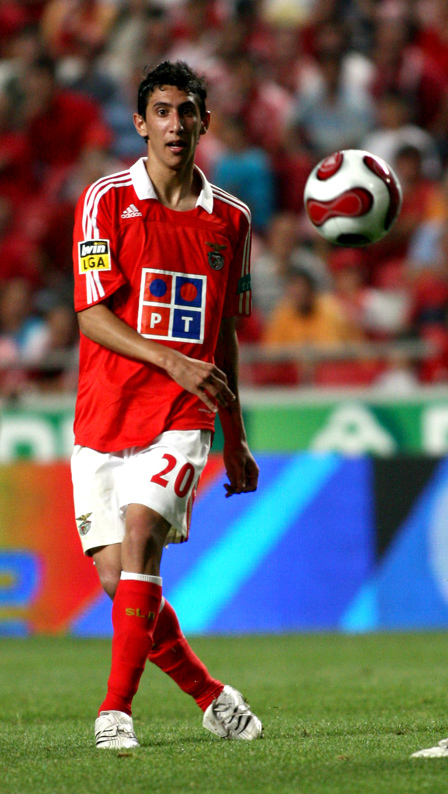
In July 2007, Di María was transferred to the Portuguese club Benfica, where he primarily played as a winger. Benfica acquired 80% of his sports rights from Rosario Central for 6.00 M EUR and also purchased 50% of the rights for Andrés Díaz. In August 2008, Benfica paid an additional 2.00 M EUR for the remaining 20% of Di María's rights, though they later re-sold 10% to GestiFute. He was signed to replace Benfica's departing captain, Simão, who had joined Atlético Madrid.
Di María's breakthrough season came in 2009-10 under the guidance of manager Jorge Jesus. On 22 October 2009, in a UEFA Europa League group stage match against Everton, he provided a hat-trick of assists in a dominant 5-0 victory at the Estádio da Luz. This defeat marked the largest loss for an English side in a European competition at that time. In the same month, Di María signed a new contract with Benfica, extending his deal until 30 June 2015, with a release clause set at a minimum of 40.00 M EUR. His performances led Diego Maradona to publicly back him as "Argentina's next superstar." He scored a brace in Benfica's 2-1 home win over AEK Athens, securing Benfica's qualification to the round of 32 as group winners. On 27 February 2010, Di María scored his first hat-trick in a 4-0 win against Leixões, earning him the headline "Magic Tri María" in Portuguese sports newspapers. He finished the season as the league's top assister with 11 assists, including two in a 5-0 win against Olhanense, as Benfica won the national championship and the domestic League Cup. He was also named Player of the Month in April.
2.3. Real Madrid
Di María's successful spell at Benfica earned him a move to Spanish giants Real Madrid, where he continued to develop his game and achieve significant team and individual honors.
2.3.1. 2010-11: Debut season
On 28 June 2010, Real Madrid announced an agreement with Benfica for Di María's transfer. He signed a five-year contract for 25.00 M EUR, with an additional 11.00 M EUR in incentives. He arrived in Madrid from Buenos Aires on 7 July and successfully passed his medical examination the following day.
He made his debut on 4 August 2010 in a friendly match against Mexican side América, which Real Madrid won 3-2. His first goal for the club came on 22 August in another friendly, a 3-1 away victory over Hércules. In the final pre-season match on 24 August, he opened the scoring in a 2-0 win against Peñarol for the Trofeo Santiago Bernabéu with a play described as a "magic moment."
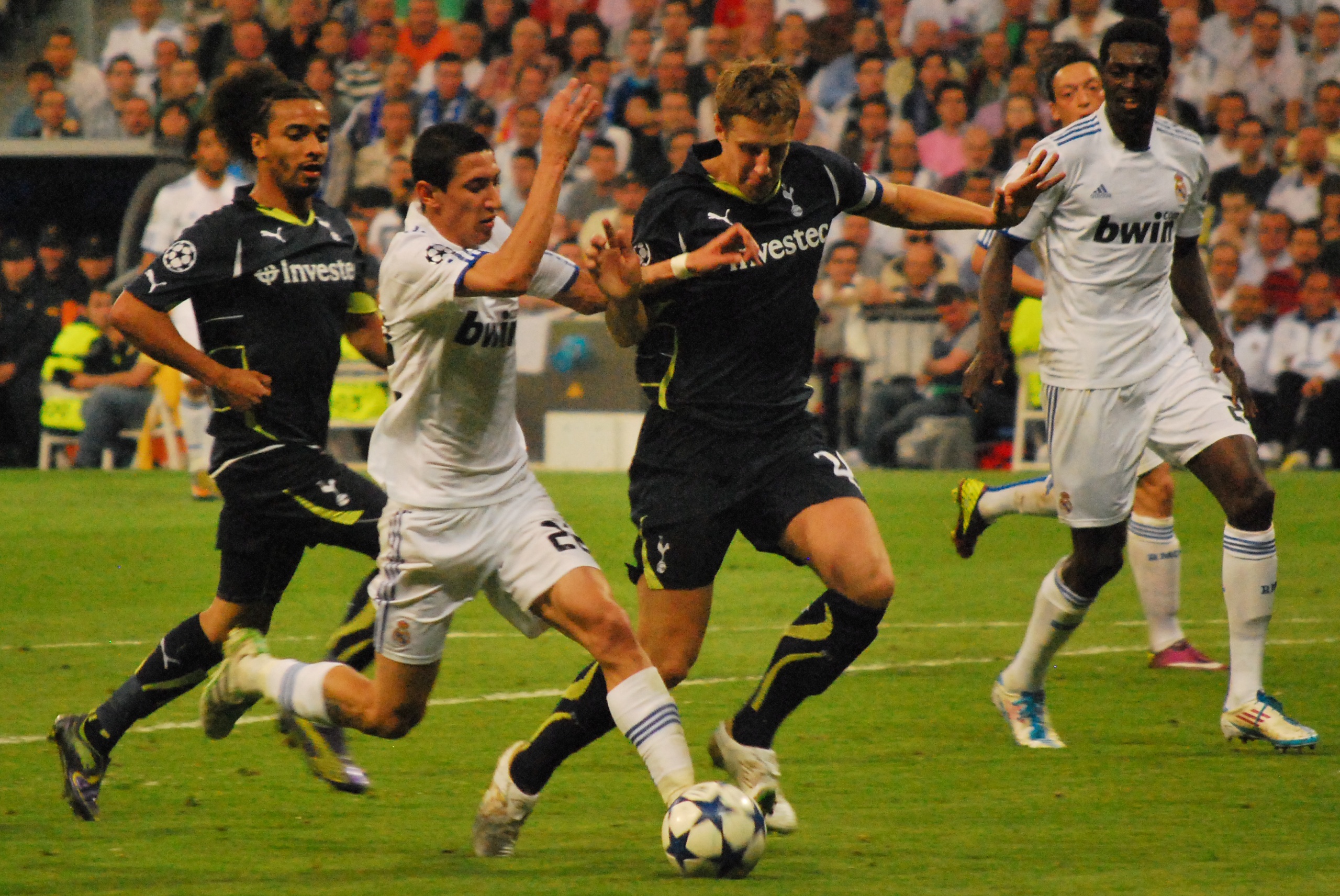
Di María's league debut was on 29 August in a 0-0 draw against Mallorca. On 18 September, he scored his first league goal for Real Madrid in a 2-1 away win over Real Sociedad. Ten days later, he netted his first UEFA Champions League goal against Auxerre in a 1-0 victory. He scored a controversial opening goal against Sevilla on 19 December. Days later, on 22 December, he provided two assists for Karim Benzema and one for Cristiano Ronaldo in a resounding 8-0 thrashing of Levante. In the second leg of the Champions League round of 16 against Lyon, he scored the third and final goal in a 3-0 win, helping Real Madrid reach the quarter-finals for the first time in seven years.
On 5 April 2011, Di María scored Real Madrid's third goal during their first-leg Champions League quarter-final victory over Tottenham Hotspur. On 20 April, he was sent off in the 31st minute of extra time in the Copa del Rey final against rival Barcelona. Real Madrid won the match 1-0, with the lone goal (in the 13th minute of extra time) being a header from Cristiano Ronaldo, which came from Di María's cross. This victory secured his first honor with Real Madrid.
2.3.2. 2011-12: La Liga win
At the beginning of the 2011-12 season, Di María faced a challenging period as he struggled to regain his form after the summer break. His early performances were inconsistent, marked by moments of brilliance interspersed with lapses in judgment. A notable example was his foul on Levante's Juanfran during Real Madrid's 1-0 defeat, which led to an on-field clash between the two teams. However, Di María's form steadily improved, and he began to create a significant lead in the assist charts. By October 2011, Real Madrid head coach José Mourinho began to favor Di María in the starting lineup over established players like Kaká and Mesut Özil, a clear indication of his rising influence.
On 27 November 2011, Di María played 60 minutes in a league match against city rivals Atlético Madrid, scoring a goal in Real Madrid's 4-1 victory. On 3 December 2011, he scored Real's first goal from a difficult angle in a 3-0 win over Sporting de Gijón in La Liga. He remained a constant threat and a regular starter as Real Madrid secured their 32nd league title, playing a key role in their 3-0 win over Athletic Bilbao that clinched the championship.
2.3.3. 2012-14: La Décima and Copa del Rey title
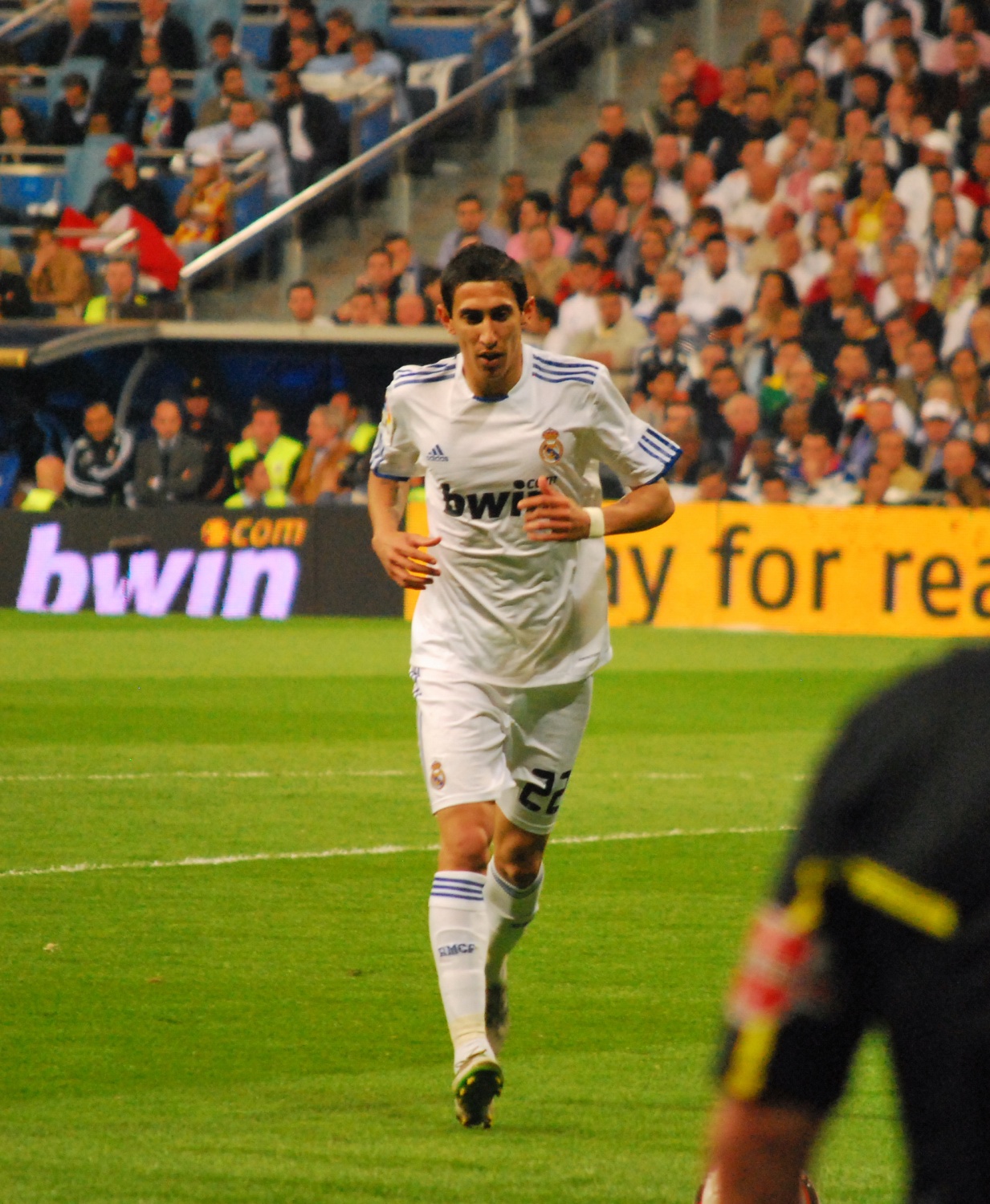
Di María scored his first goal of the 2012-13 season against Barcelona in the first leg of the 2012 Supercopa de España at Camp Nou, capitalizing on a mistake by Barcelona goalkeeper Víctor Valdés. Despite not having his best individual season, he made crucial contributions in significant moments. Notably, on 13 February, he delivered the cross for Cristiano Ronaldo's goal against Manchester United. He registered 17 assists and scored nine goals across 52 appearances throughout the season, including important strikes against Atlético Madrid and Málaga. On 9 August 2012, Di María signed a new contract with Real Madrid, extending his stay at the club until 2018.
On 2 October 2013, Di María scored two goals against Copenhagen in Real Madrid's 4-0 Champions League victory. Later in the season, under the tactical decisions of new manager Carlo Ancelotti, Di María's playing position was permanently shifted to that of an offensive-minded central midfielder. He was frequently deployed in the starting lineup alongside Luka Modrić and Xabi Alonso in midfield within the team's 4-3-3 formation, a move that proved highly successful. He contributed to the club's 2-1 victory over Barcelona in the 2014 Copa del Rey Final by scoring the opening goal. Di María finished the season as the top assist maker in La Liga, providing 17 assists.
In the 2014 UEFA Champions League Final against Atlético Madrid on 24 May 2014, Di María's decisive play was instrumental. He dribbled past two players and forced a save from goalkeeper Thibaut Courtois. The rebound was headed into the net by his teammate Gareth Bale in the 110th minute, giving Real Madrid a 2-1 lead in what became a 4-1 victory. Di María was named man of the match by UEFA for his outstanding performance, with the honor presented by former Manchester United head coach Sir Alex Ferguson.
Di María was an unused substitute when Real Madrid won the 2014 UEFA Super Cup against Sevilla on 12 August. A week later, in the first leg of the Supercopa de España, he played the final 15 minutes of a 1-1 home draw against Atlético Madrid, replacing Luka Modrić.
2.4. Manchester United
On 26 August 2014, Di María signed a five-year deal with Manchester United for a transfer fee of 59.70 M GBP, which was then a British record and one of the most expensive transfers in football history. He inherited the prestigious number 7 shirt at United, previously worn by club legends such as George Best, Bryan Robson, Eric Cantona, David Beckham, and Cristiano Ronaldo. However, in an open letter to Real Madrid fans, Di María stated that he had never wanted to leave Real Madrid, but felt unsupported and unfairly treated by the club's board.
Di María made his debut on 30 August in a 0-0 draw with Burnley, where he was substituted after 70 minutes. He scored his first goal for United on 14 September, netting directly from a free-kick in a 4-0 win over Queens Park Rangers. He also provided an assist for Juan Mata's goal in the same match, earning him the Man of the Match award. His performance was highlighted by Sky Sports' 'Player Cam' feature, specially brought back for the match. In the next game, a 5-3 loss to Leicester City on 21 September, he again scored a goal and provided an assist.
On 2 October, Di María was named Manchester United's Player of the Month for September, having recorded two goals and two assists in his first four matches. A week later, his chipped goal against Kasper Schmeichel in the Leicester match was voted the club's Goal of the Month. He continued his fine form on 5 October by scoring and assisting Radamel Falcao in United's 2-1 victory over Everton. However, his momentum was interrupted on 29 November when he suffered a hamstring injury 13 minutes into United's 3-0 win over Hull City, limiting him to just one substitute appearance in the next seven matches.
On 4 January 2015, Di María returned from injury, scoring a late goal in a 2-0 FA Cup third-round win against Yeovil Town. A week later, manager Louis van Gaal deployed him as a forward in a 1-0 home defeat to Southampton. This new role came amidst a period of poor form for Di María, who was perceived to have struggled since October. On 9 March, he was sent off during United's 2-1 home FA Cup sixth-round loss to Arsenal. He was booked for diving and then for grabbing referee Michael Oliver's shirt, though he had earlier set up Wayne Rooney's equalizer. By the end of the season, The Daily Telegraph controversially judged Di María to be the worst signing of the season.
2.5. Paris Saint-Germain
Di María's move to Paris Saint-Germain marked a significant turning point in his career, where he rediscovered his form and became a key figure in the club's domestic dominance.
2.5.1. 2015-16: Transfer and domestic quadruple
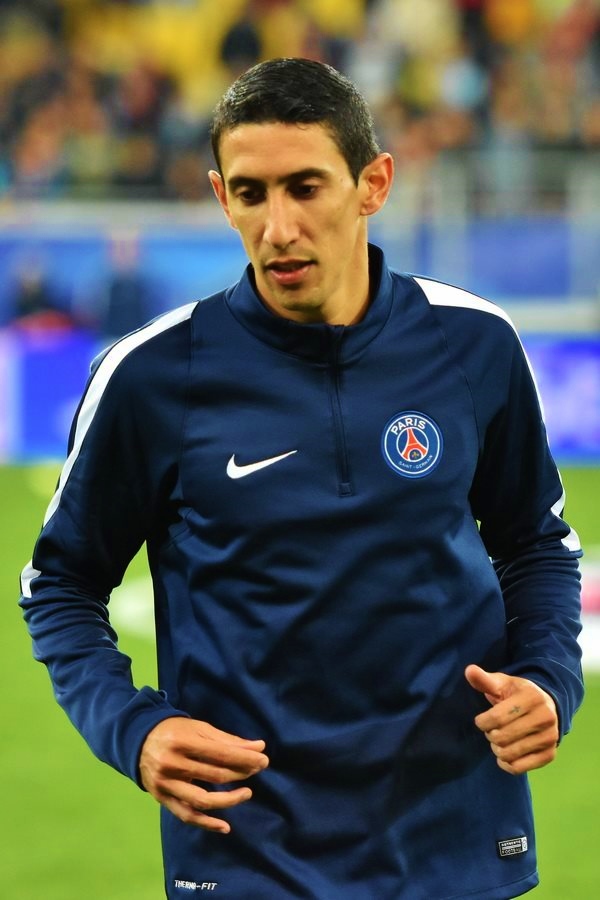
On 25 July 2015, Di María controversially failed to board a flight to the United States to join Manchester United's pre-season tour, with manager Louis van Gaal stating he "did not know why." On 2 August, reports emerged that Di María would undergo a medical ahead of a move to Paris Saint-Germain. Four days later, Manchester United confirmed his sale to the French champions for an undisclosed fee, believed to be around 44.00 M GBP. He signed a four-year contract.
Di María made his Ligue 1 debut on 30 August, coming on as a 66th-minute substitute for Lucas in a 3-0 away win against Monaco at the Stade Louis II. He assisted Ezequiel Lavezzi for the final goal. On 15 September, Di María scored his first goal for PSG on his UEFA Champions League debut for the club, contributing to a 2-0 win over Malmö FF at the Parc des Princes. Seven days later, he scored his first Ligue 1 goal as PSG defeated Guingamp 3-0. On 23 April 2016, Di María scored the winning goal for PSG in the 2016 Coupe de la Ligue Final against Lille at the Stade de France. He concluded the 2015-16 season by setting a new Ligue 1 record for assists in a single season with 18.
2.5.2. 2016-2020: Sustained domestic success and European final
In the 2016-17 Champions League group stage home match against Basel on 19 October 2016, Di María scored the opening goal in the 40th minute, contributing to a 3-0 victory for PSG and marking his first goal of the season. On 19 November, he opened the scoring with his first Ligue 1 goal of the season in a 2-0 home win against Nantes.
On 14 February 2017, Di María scored a brace as PSG defeated Barcelona 4-0 in the first leg of the 2016-17 UEFA Champions League round of 16 at the Parc des Princes. On 1 April, he scored in PSG's 4-1 win over Monaco in the 2017 Coupe de la Ligue final. On 8 May 2018, he played as PSG secured a 2-0 victory against Les Herbiers to clinch the 2017-18 Coupe de France.
In the first leg of PSG's Champions League round of 16 tie against his former club Manchester United in the 2018-19 season, Di María sustained a serious injury following a tackle from Ashley Young. Despite the injury, he refused to be substituted and, in the final moments of the game, assisted Kylian Mbappé's goal for a 2-0 win at Old Trafford. However, PSG ultimately lost 3-1 in the second leg and were eliminated in the round of 16 for the third consecutive season.
In the 2019-20 UEFA Champions League group stage, Di María scored a brace in a 3-0 win over his former club Real Madrid on 18 September 2019. On 18 August 2020, Di María scored a goal and recorded two assists in PSG's 3-0 Champions League semi-final victory over RB Leipzig. This performance earned him the Man of the Match award and propelled the club to its first Champions League final, which they ultimately lost 1-0 to Bayern Munich.
2.5.3. 2020-2022: Assist record and departure
On 23 September 2020, Di María was handed a four-match suspension for a spitting incident with Álvaro González during Le Classique 10 days earlier. This ban caused him to miss league matches against Angers, Nîmes, Dijon, and Nantes. In a UEFA Champions League match against RB Leipzig on 4 November, Di María scored the opening goal in an eventual 2-1 defeat. He returned to league action three days later against Rennes, scoring a goal to help PSG win 3-0.
In a home match against İstanbul Başakşehir on 9 December 2020, Di María recorded two assists, making him the player with the third most assists in UEFA Champions League history with a tally of 32, trailing only Lionel Messi and Cristiano Ronaldo. On 12 March 2021, Di María extended his contract with Paris Saint-Germain for one more season, with an option for a second. On 4 May, Di María was sent off against Manchester City in the Champions League semi-finals for stamping on Fernandinho in an off-the-ball incident, resulting in a three-match ban in European competitions. In the 2021 Coupe de France Final, where PSG defeated Monaco 2-0, Di María broke the all-time assist record for PSG by delivering a pass for a Kylian Mbappé goal, marking his 104th assist as a PSG player.
In the 2021-22 season, Di María won his fifth Ligue 1 title with Paris Saint-Germain. On 20 May 2022, his departure from Paris at the end of his contract was confirmed. In his last match for the club against Metz on 21 May, Di María scored a goal and recorded an assist, contributing to a 5-0 win. He received a heartfelt tribute and ovation from the Parc des Princes crowd. Di María concluded his spell at PSG with 92 goals and 112 assists in 295 matches across all competitions.
2.6. Juventus
On 8 July 2022, Di María joined Juventus as a free agent after signing a one-year contract with the Italian club. He made his club debut on 15 August in Juventus's opening match of the Serie A season, scoring the opening goal and later assisting Dušan Vlahović's second goal in an eventual 3-0 home win. However, he was substituted in the second half after sustaining an injury.
On 15 September, he made his 100th Champions League appearance, and his debut with Juventus in that competition, in a 2-1 home defeat against his former club Benfica. On 5 October, Di María provided a hat-trick of assists in a 3-1 home win against Maccabi Haifa in the Champions League, making him the third highest assist provider in the competition's history. Despite his contributions, Juventus finished third in the group stage, which relegated them to the Europa League knockout round play-offs. This marked the first time since 2013 that Juventus failed to reach the Champions League knockout stages.
On 23 February 2023, he scored a hat-trick in a 3-0 away win over Nantes in the Europa League. On 9 March, he scored his fourth goal in the competition, netting the only goal in a home win over Freiburg. He impressed during the season, despite suffering multiple hamstring injuries that limited his game time. On 6 June, Di María confirmed his departure from Juventus following the expiry of his contract.
2.7. Return to Benfica
Amidst growing interest from Saudi clubs, Di María put an end to speculation on 6 July 2023 by signing a one-year contract with Benfica. He was presented in front of 2,500 enthusiastic Benfica supporters at the entrance of Estádio da Luz, marking his return to the club where he began his European career.
On 9 August, Di María made his second debut for Benfica, scoring the opening goal in a 2-0 victory over Porto in the Supertaça Cândido de Oliveira, securing his first trophy back with the club. With two assists and a goal in a 4-0 win over Vitória de Guimarães on 2 September, he reached five goal contributions in his first four league games. On 29 September, he scored the only goal in a home win over Porto in the Primeira Liga, allowing his side to maintain their top position in the league table. Following a disappointing Champions League campaign, in Benfica's last group match on 12 December, Di María scored his first Champions League goal with Benfica directly from a corner kick in a 3-1 away win over Red Bull Salzburg. This goal proved essential for the Eagles to qualify for the UEFA Europa League knock-out round play-offs.
3. International career
Di María's international career is deeply intertwined with the success of the Argentina national team, particularly alongside his long-time teammate Lionel Messi. Their bond, forged over many years of playing together, has been a significant factor in Argentina's recent triumphs.
3.1. Youth career
Di María's international career began with the Argentina youth teams, where he quickly achieved significant success.
3.1.1. 2007-2008: Success at youth level
In 2007, Di María was selected to play for the Argentina under-20 team. He participated in the 2007 South American U-20 Championship in Paraguay. Later that year, he was called up for the 2007 FIFA U-20 World Cup in Canada. Argentina went on to win the tournament, with Di María scoring three goals during the campaign.
On 28 January 2008, Di María and several of his under-20 teammates were called up for the Argentina Olympic football team for the 2008 Beijing Olympic Games. He proved to be a pivotal player, scoring the extra-time game-winning goal in the 105th minute of his team's 2-1 quarter-final win over the Netherlands, following a pass from Lionel Messi. On 23 August, Di María scored another crucial game-winner in the final against Nigeria. His chip over the goalkeeper from the edge of the area in the 57th minute secured a 1-0 victory, earning Argentina their second successive Olympic gold medal in football.
3.2. Senior career
Di María made his senior debut for Argentina in 2008 and went on to become one of the most capped and influential players in the nation's history.
3.2.1. 2008-2010: Senior debut and early national team career
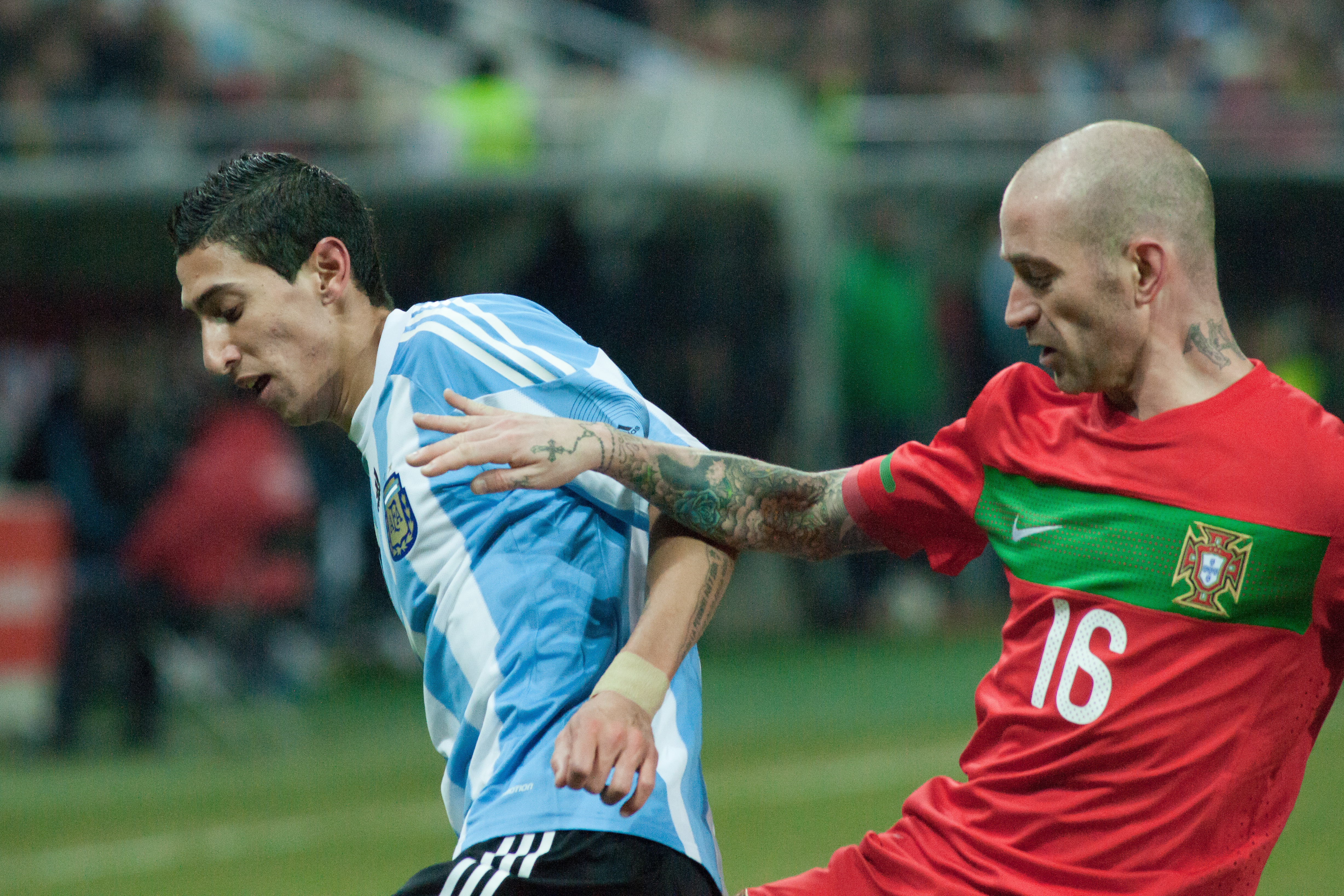
On 6 September 2008, Di María made his debut for the Argentina senior team in a match against Paraguay. On 19 May 2010, he was selected by Argentinian manager Diego Maradona in the 23-man squad for the 2010 FIFA World Cup in South Africa. On 24 May, Di María scored his debut international goal in a 5-0 friendly win over Canada. At the World Cup, he helped Argentina reach the quarter-finals, playing in all five of Argentina's matches and starting four of them.
Following the World Cup, on 11 August 2010, Di María scored the first-ever international goal at Dublin's new Aviva Stadium in a friendly against the Republic of Ireland, as Argentina won 1-0. He appeared three times during the 2011 Copa América, scoring once in a 3-0 defeat of Costa Rica in the group stage.
3.2.2. 2014-2017: World Cup and Copa América finals
Di María made 12 appearances during the 2014 FIFA World Cup qualification campaign and was included in the Argentina national team for the tournament finals. In Argentina's round of 16 match against Switzerland, Di María scored the only goal of the game after 118 minutes, from a Lionel Messi assist. During the quarter-final match against Belgium, Di María suffered a muscle tear in his thigh and was later taken off the field. It was announced after the match that he would miss the remainder of the tournament due to the injury. He had previously helped to create Gonzalo Higuaín's only goal of the match, which sent Argentina into the semi-finals. Argentina finished the tournament as runners-up to Germany. On 11 July, Di María was named on the ten-man shortlist for FIFA's Golden Ball award for the tournament's best player.
On 3 September 2014, in a friendly away against world champions Germany, Di María was directly involved in all four of Argentina's goals in a 4-2 victory, assisting three and scoring one.
On 28 May 2015, Di María was included in the Argentina national team for the 2015 Copa América. On 6 June, he was selected to captain the team in the absence of Lionel Messi for a warm-up match against Bolivia, scoring twice in a 5-0 win. A week later, in their opening match of the tournament against Paraguay in La Serena, Di María won a penalty which Messi scored in a 2-2 draw. On 30 June, he scored twice and assisted a goal for Sergio Agüero, as Argentina defeated Paraguay 6-1 to reach the final. However, he was substituted with a hamstring injury within the first half-hour of the final against hosts Chile, which his team lost in a penalty shootout after a goalless draw.
In Argentina's opening match of the Copa América Centenario on 6 June 2016, a rematch of the previous tournament's final against defending champions Chile, Di María scored the opening goal and later assisted Éver Banega's goal in a 2-1 win. Di María dedicated the goal to his recently deceased grandmother. In his nation's second group match, against Panama on 10 June, he assisted Nicolás Otamendi's opening goal but was again forced off due to injury. Argentina won the match 5-0. He missed the rest of the tournament due to injury as Argentina reached the Copa América final for the second consecutive time, once again losing to Chile on penalties after a 0-0 draw.
3.2.3. 2018-2020: World Cup disappointment and Copa América third-place
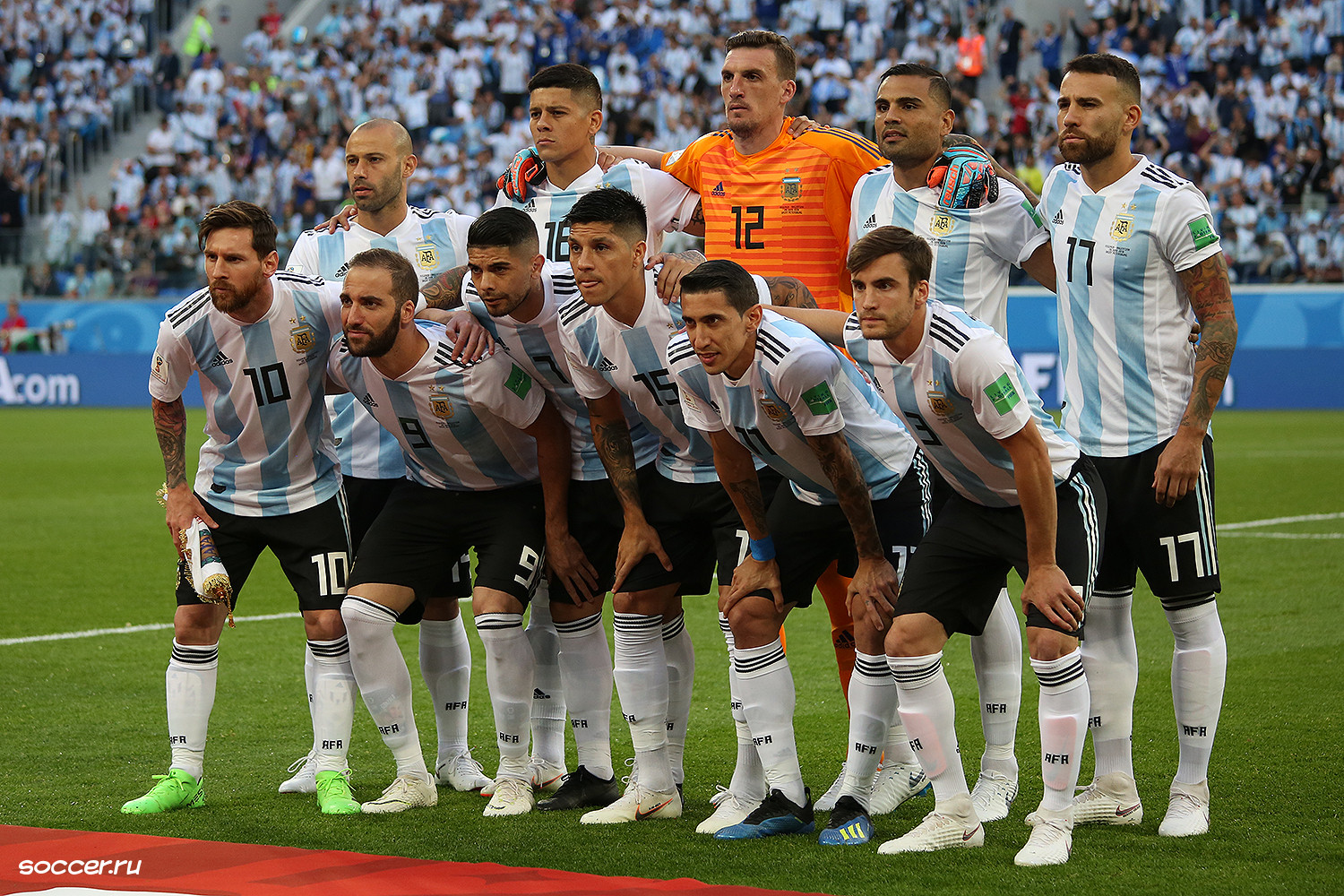
Di María made 18 appearances in the 2018 FIFA World Cup qualification campaign. On 22 May 2018, Di María was named in the 23-man squad by manager Jorge Sampaoli for the 2018 FIFA World Cup in Russia. On 30 June, he scored a long-range goal against France in a 4-3 defeat which saw Argentina eliminated from the World Cup in the Round of 16. On 21 May 2019, he was included in the Lionel Scaloni final 23-man Argentina squad for the 2019 Copa América.
3.2.4. 2021-2024: World Cup triumph, back-to-back Copa América titles, and retirement
In June 2021, Di María was included in the Argentina national team for the 2021 Copa América in Brazil. On 21 June, he assisted the only goal of the match, scored by Papu Gómez, in Argentina's third group match against Paraguay; the result allowed his side to progress to the quarter-finals. In the final of the tournament against the hosts Brazil on 10 July, he scored the only goal of the match to give Argentina their joint record 15th Copa América title with Uruguay and their first international title since 1993. He ran onto a long pass from Rodrigo De Paul into the Brazilian penalty area, controlled the slightly deflected ball with the outside of his left foot, and then chipped it over goalkeeper Ederson, giving Argentina an early lead. Although he was substituted late in the second half, the goal proved to be the winning effort for Argentina.
On 1 June 2022, Di María scored Argentina's second goal in a 3-0 win over the reigning European champions, Italy, at Wembley Stadium in the 2022 Finalissima.
On 11 November 2022, Di María was named in the final squad for the 2022 FIFA World Cup in Qatar. On 26 November, he recorded an assist on Messi's opening goal in Argentina's second group match, a 2-0 win over Mexico. On 18 December, Di María scored his team's second goal against France in the final, minutes after winning the penalty for the first goal. Argentina defeated France 4-2 on penalties after the match ended 3-3 in extra-time, to win their third World Cup. Di María was surprised by coach Lionel Scaloni's decision to start him on the left, initially thinking Scaloni was "confused," but Scaloni convinced him of the tactical plan.
In October 2023, Di María announced that he would be retiring from the national team after the 2024 Copa América. In Argentina's final group match against Peru, he set up Lautaro Martínez's first goal in a 2-0 win, which saw Argentina advance to the quarter-finals after topping their group. In the final against Colombia, he wore the captain's armband after Messi went down with an injury in the 65th minute. He played 117 minutes before being substituted for Otamendi. Argentina won the match 1-0, marking their second consecutive Copa América triumph and third consecutive international tournament trophy. This was Di María's final game for Argentina, ending his international career as a champion.
4. Style of play
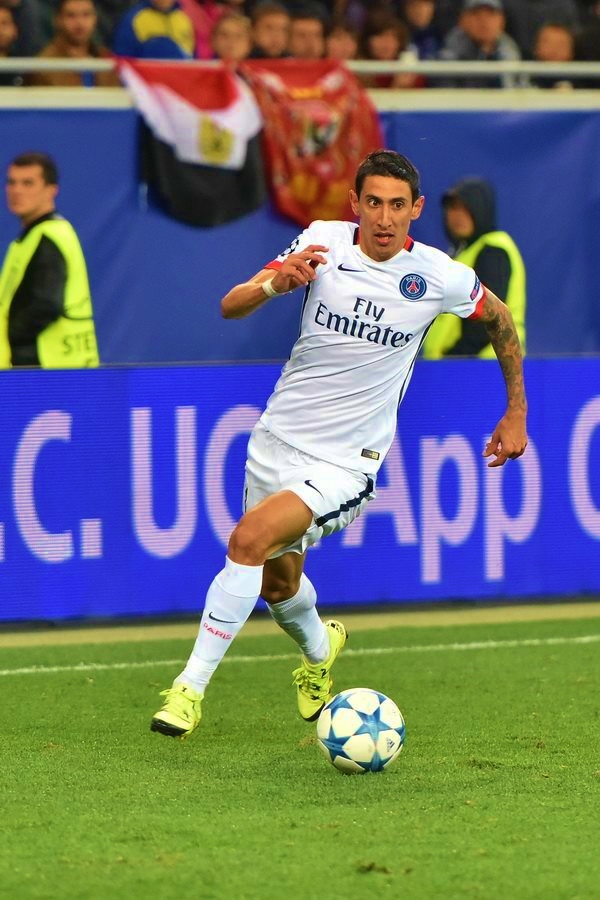
Ángel Di María is a quick, strong, tricky, and talented winger who is also capable of playing as a more central attacking midfielder or on either side of the pitch, although he is predominantly a left-footed player. Under Carlo Ancelotti's tenure with Real Madrid, he was effectively deployed as a central midfielder. Despite his slender frame, Di María is an agile, creative, and highly technical player. He possesses excellent dribbling skills and ball control, coupled with great pace, stamina, movement, and acceleration, which allow him to easily beat opponents in one-on-one situations.
He is also gifted with excellent vision, set-piece delivery, passing, and crossing ability, enabling him to function effectively as a playmaker and an assist provider. While primarily known for his creativity, he is also capable of scoring goals himself and is an accurate free-kick taker. Despite not being physically imposing, he is a very hard-working player, and he significantly improved the defensive aspect of his game under manager José Mourinho.
Di María has earned widespread praise in the media for his decisive performances in important matches throughout his career, often being referred to as a "man of finals" due to his knack for scoring crucial goals in championship games. His signature move includes powerful turning shots, famously seen in his goals against France in the 2018 FIFA World Cup, Brazil in the 2021 Copa América final, and Nigeria in the 2008 Summer Olympics final. He tends to perform better as the stakes get higher, with his impact growing from group stages to knockout rounds and peaking in finals. Despite his abilities, he has often struggled with injuries throughout his career.
5. Personal life
Di María is affectionately nicknamed "Fideo" (FideonoodleSpanish) in Spanish, a reference to his slender physique. Due to his Italian ancestry, he holds an Italian passport, which granted him the right to work within the European Union, simplifying his transfers to European clubs. He is a Roman Catholic and is known for his devout faith, often performing a prayer in the locker room before matches. He also has a tattoo on his arm with a message dedicated to his hometown of Perdriel, which he often kisses before games.
5.1. Family and relationships
He married fellow Argentine Jorgelina Cardoso in 2011. Together, they have two daughters, Mia and Pia. Their first daughter, Mia, was born three months prematurely and survived after receiving intensive care treatment at the Hospital Universitario Montepríncipe in Madrid.
5.2. Incidents and controversies
On 31 January 2015, while playing for Manchester United, Di María's home in Prestbury, Cheshire, was the scene of an attempted burglary.
On 2 September 2020, it was reported that Di María, along with PSG teammates Neymar and Leandro Paredes, had tested positive for COVID-19. The French sports newspaper L'Équipe reported that the three players had reportedly been on vacation in Ibiza. As a result, they had to quarantine for one week, and other players and staff were scheduled for testing.
During a match between PSG and Nantes on 14 March 2021, Di María's home was robbed, and his family was held hostage. He was substituted off the pitch by manager Mauricio Pochettino, who informed him of the situation. A similar incident also occurred at the home of PSG teammate Marquinhos' parents.
5.2.1. Pandora Papers
Di María is one of 13 sports personalities named in the Pandora Papers published by the International Consortium of Investigative Journalists (ICIJ). The investigation revealed that he used a company in Panama, named Sunpex Corporation Inc., to manage his image rights contracts for months before joining Real Madrid. This shell company, created specifically for this purpose, was used by him since 2009 and reportedly continues to be in use. The Pandora Papers indicate that Di María handled over 8.00 M EUR through Sunpex Corporation Inc. between 2013 and 2017.
6. Career statistics
6.1. Club
| Club | Season | League | National cup | League cup | Continental | Other | Total | |||||||
|---|---|---|---|---|---|---|---|---|---|---|---|---|---|---|
| Division | Apps | Goals | Apps | Goals | Apps | Goals | Apps | Goals | Apps | Goals | Apps | Goals | ||
| Rosario Central | 2005-06 | Argentine Primera División | 10 | 0 | 0 | 0 | - | 4 | 0 | 0 | 0 | 14 | 0 | |
| 2006-07 | Argentine Primera División | 25 | 6 | 0 | 0 | - | 0 | 0 | 0 | 0 | 25 | 6 | ||
| Total | 35 | 6 | 0 | 0 | - | 4 | 0 | 0 | 0 | 39 | 6 | |||
| Benfica | 2007-08 | Primeira Liga | 26 | 0 | 5 | 0 | 3 | 0 | 11 | 1 | 0 | 0 | 45 | 1 |
| 2008-09 | Primeira Liga | 24 | 2 | 1 | 0 | 5 | 1 | 5 | 1 | 0 | 0 | 35 | 4 | |
| 2009-10 | Primeira Liga | 26 | 5 | 1 | 0 | 4 | 1 | 14 | 4 | 0 | 0 | 45 | 10 | |
| Total | 76 | 7 | 7 | 0 | 12 | 2 | 30 | 6 | 0 | 0 | 125 | 15 | ||
| Real Madrid | 2010-11 | La Liga | 35 | 6 | 8 | 0 | - | 10 | 3 | 0 | 0 | 53 | 9 | |
| 2011-12 | La Liga | 23 | 5 | 0 | 0 | - | 7 | 2 | 2 | 0 | 32 | 7 | ||
| 2012-13 | La Liga | 32 | 7 | 7 | 1 | - | 11 | 0 | 2 | 1 | 52 | 9 | ||
| 2013-14 | La Liga | 34 | 4 | 7 | 4 | - | 11 | 3 | 0 | 0 | 52 | 11 | ||
| 2014-15 | La Liga | 0 | 0 | - | - | - | 1 | 0 | 1 | 0 | ||||
| Total | 124 | 22 | 22 | 5 | - | 39 | 8 | 5 | 1 | 190 | 36 | |||
| Manchester United | 2014-15 | Premier League | 27 | 3 | 5 | 1 | 0 | 0 | - | - | 32 | 4 | ||
| Paris Saint-Germain | 2015-16 | Ligue 1 | 29 | 10 | 4 | 0 | 4 | 2 | 10 | 3 | 0 | 0 | 47 | 15 |
| 2016-17 | Ligue 1 | 29 | 6 | 3 | 1 | 3 | 3 | 7 | 4 | 1 | 0 | 43 | 14 | |
| 2017-18 | Ligue 1 | 30 | 11 | 6 | 7 | 4 | 2 | 5 | 1 | 0 | 0 | 45 | 21 | |
| 2018-19 | Ligue 1 | 30 | 12 | 4 | 3 | 2 | 0 | 8 | 2 | 1 | 2 | 45 | 19 | |
| 2019-20 | Ligue 1 | 26 | 8 | 2 | 0 | 3 | 1 | 9 | 3 | 1 | 1 | 41 | 13 | |
| 2020-21 | Ligue 1 | 27 | 4 | 5 | 0 | - | 10 | 1 | 1 | 0 | 43 | 5 | ||
| 2021-22 | Ligue 1 | 26 | 5 | 0 | 0 | - | 5 | 0 | 0 | 0 | 31 | 5 | ||
| Total | 197 | 56 | 24 | 11 | 16 | 8 | 54 | 14 | 4 | 3 | 295 | 92 | ||
| Juventus | 2022-23 | Serie A | 26 | 4 | 4 | 0 | - | 10 | 4 | - | 40 | 8 | ||
| Benfica | 2023-24 | Primeira Liga | 28 | 9 | 5 | 0 | 3 | 2 | 11 | 5 | 1 | 1 | 48 | 17 |
| 2024-25 | Primeira Liga | 18 | 7 | 2 | 3 | 3 | 3 | 9 | 1 | 0 | 0 | 32 | 14 | |
| Total | 46 | 16 | 7 | 3 | 6 | 5 | 20 | 6 | 1 | 1 | 80 | 31 | ||
| Career total | 531 | 114 | 69 | 20 | 34 | 15 | 157 | 38 | 10 | 5 | 801 | 192 | ||
6.2. International
| National team | Year | Apps | Goals |
|---|---|---|---|
| Argentina | 2008 | 1 | 0 |
| 2009 | 5 | 0 | |
| 2010 | 11 | 2 | |
| 2011 | 10 | 3 | |
| 2012 | 8 | 3 | |
| 2013 | 9 | 1 | |
| 2014 | 13 | 2 | |
| 2015 | 13 | 4 | |
| 2016 | 12 | 3 | |
| 2017 | 10 | 1 | |
| 2018 | 5 | 1 | |
| 2019 | 5 | 0 | |
| 2020 | 2 | 0 | |
| 2021 | 14 | 2 | |
| 2022 | 11 | 6 | |
| 2023 | 7 | 1 | |
| 2024 | 9 | 2 | |
| Total | 145 | 31 | |
Scores and results list Argentina's goal tally first, score column indicates score after each Di María goal.
| No. | Date | Venue | Opponent | Score | Result | Competition |
|---|---|---|---|---|---|---|
| 1 | 24 May 2010 | Estadio Antonio Vespucio Liberti, Buenos Aires, Argentina | Canada | 3-0 | 5-0 | Friendly |
| 2 | 11 August 2010 | Aviva Stadium, Dublin, Ireland | Republic of Ireland | 1-0 | 1-0 | |
| 3 | 9 February 2011 | Stade de Genève, Carouge, Switzerland | Portugal | 1-0 | 2-1 | |
| 4 | 11 July 2011 | Estadio Mario Alberto Kempes, Córdoba, Argentina | Costa Rica | 3-0 | 3-0 | 2011 Copa América |
| 5 | 6 September 2011 | Bangabandhu National Stadium, Dhaka, Bangladesh | Nigeria | 2-0 | 3-1 | Friendly |
| 6 | 2 June 2012 | Estadio Antonio Vespucio Liberti, Buenos Aires, Argentina | Ecuador | 4-0 | 4-0 | 2014 FIFA World Cup qualification |
| 7 | 15 August 2012 | Commerzbank-Arena, Frankfurt am Main, Germany | Germany | 3-0 | 3-1 | Friendly |
| 8 | 7 September 2012 | Estadio Mario Alberto Kempes, Córdoba, Argentina | Paraguay | 1-0 | 3-1 | 2014 FIFA World Cup qualification |
| 9 | 10 September 2013 | Estadio Defensores del Chaco, Asunción, Paraguay | Paraguay | 1-0 | 5-2 | |
| 10 | 1 July 2014 | Arena Corinthians, São Paulo, Brazil | Switzerland | 1-0 | 1-0 | 2014 FIFA World Cup |
| 11 | 3 September 2014 | Esprit Arena, Düsseldorf, Germany | Germany | 4-0 | 4-2 | Friendly |
| 12 | 6 June 2015 | Estadio San Juan del Bicentenario, San Juan, Argentina | Bolivia | 1-0 | 5-0 | |
| 13 | 5-0 | |||||
| 14 | 30 June 2015 | Estadio Municipal de Concepción, Concepción, Chile | Paraguay | 3-1 | 6-1 | 2015 Copa América |
| 15 | 4-1 | |||||
| 16 | 24 March 2016 | Estadio Nacional Julio Martínez Prádanos, Santiago, Chile | Chile | 1-1 | 2-1 | 2018 FIFA World Cup qualification |
| 17 | 6 June 2016 | Levi's Stadium, Santa Clara, United States | Chile | 1-0 | 2-1 | Copa América Centenario |
| 18 | 15 November 2016 | Estadio San Juan del Bicentenario, San Juan, Argentina | Colombia | 3-0 | 3-0 | 2018 FIFA World Cup qualification |
| 19 | 13 June 2017 | National Stadium, Kallang, Singapore | Singapore | 6-0 | 6-0 | Friendly |
| 20 | 30 June 2018 | Kazan Arena, Kazan, Russia | France | 1-1 | 3-4 | 2018 FIFA World Cup |
| 21 | 10 July 2021 | Estádio do Maracanã, Rio de Janeiro, Brazil | Brazil | 1-0 | 1-0 | 2021 Copa América |
| 22 | 12 November 2021 | Estadio Campeón del Siglo, Montevideo, Uruguay | Uruguay | 1-0 | 1-0 | 2022 FIFA World Cup qualification |
| 23 | 27 January 2022 | Estadio Zorros del Desierto, Calama, Chile | Chile | 1-0 | 2-1 | |
| 24 | 25 March 2022 | La Bombonera, Buenos Aires, Argentina | Venezuela | 2-0 | 3-0 | |
| 25 | 1 June 2022 | Wembley Stadium, London, England | Italy | 2-0 | 3-0 | 2022 Finalissima |
| 26 | 16 November 2022 | Mohammed bin Zayed Stadium, Abu Dhabi, United Arab Emirates | United Arab Emirates | 2-0 | 5-0 | Friendly |
| 27 | 3-0 | |||||
| 28 | 18 December 2022 | Lusail Iconic Stadium, Lusail, Qatar | France | 2-0 | 3-3 - (4-2 on penalties) | 2022 FIFA World Cup |
| 29 | 28 March 2023 | Estadio Único Madre de Ciudades, Santiago del Estero, Argentina | Curaçao | 6-0 | 7-0 | Friendly |
| 30 | 26 March 2024 | Los Angeles Memorial Coliseum, Los Angeles, United States | Costa Rica | 1-1 | 3-1 | |
| 31 | 9 June 2024 | Soldier Field, Chicago, United States | Ecuador | 1-0 | 1-0 |
7. Honours
Ángel Di María has accumulated an impressive list of team and individual honors throughout his distinguished career, reflecting his consistent impact at the highest levels of football.
7.1. Club
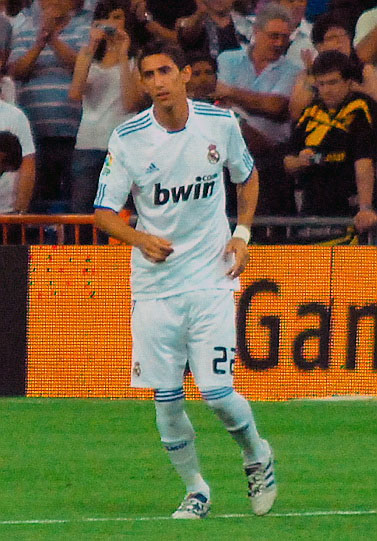
- Primeira Liga: 2009-10
- Taça da Liga: 2008-09, 2009-10, 2024-25
- Supertaça Cândido de Oliveira: 2023
Real Madrid
- La Liga: 2011-12
- Copa del Rey: 2010-11, 2013-14
- Supercopa de España: 2012
- UEFA Champions League: 2013-14
- UEFA Super Cup: 2014
Paris Saint-Germain
- Ligue 1: 2015-16, 2017-18, 2018-19, 2019-20, 2021-22
- Coupe de France: 2015-16, 2016-17, 2017-18, 2019-20, 2020-21
- Coupe de la Ligue: 2015-16, 2016-17, 2017-18, 2019-20
- Trophée des Champions: 2016, 2017, 2018, 2019, 2020
7.2. International
Argentina U20
- FIFA U-20 World Cup: 2007
Argentina Olympic
- Olympic Games: 2008
Argentina
- FIFA World Cup: 2022
- Copa América: 2021, 2024
- CONMEBOL-UEFA Cup of Champions: 2022
7.3. Individual
- Argentine Footballer of the Year: 2014
- FIFA FIFPro World11: 2014
- FIFA World Cup Dream Team: 2014
- IFFHS CONMEBOL Team of the Decade 2011-2020
- UEFA Team of the Year: 2014
- ESM Team of the Year: 2015-16, 2019-20
- UEFA Champions League Squad of the Season: 2013-14
- UEFA Champions League top assist provider: 2019-20
- UEFA Europa League top assist provider: 2009-10 (Shared with Mesut Özil)
- Primeira Liga top assist provider: 2009-10
- La Liga top assist provider: 2013-14
- Ligue 1 top assist provider: 2015-16, 2019-20
- SJPF Player of the Month: April 2010
- UNFP Ligue 1 Player of the Month: December 2015
- UNFP Ligue 1 Team of the Year: 2015-16, 2018-19
- Primeira Liga Player of the Month: November 2024